2.1 About us
Madrileña Red de Gas S.A.U. (MRG) is a sole proprietorship company that operates in the natural gas distribution sector, as well as in the sale of piped liquefied petroleum gas. Our main activity is listed in the National Classification of Economic Activities as CNAE 3522 – pipeline distribution of gas fuel.
We are the first company in the Iberian Peninsula that operates completely independently from the other businesses in the gas value chain, making us the leading example of a complete separation of networks and sales on the Spanish and Portuguese energy market. We are also the third largest gas distribution company in Spain by number of supply points (915,209 as of December 2021).
We began operating on 1 May 2010 in 38 municipalities in the Region of Madrid. We currently distribute gas in 61 municipalities in the region, including the city of Madrid itself, where we operate in five districts.
Our offices are located on calle Virgilio, 2 in Pozuelo de Alarcón. From December 2021 we also have a new work site at calle Valdemorillo, 60 in Alcorcón.
Global Real Estate Sustainability Benchmark (GRESB) gave us two special mentions for “Infrastructure asset most improved”, in recognition of the company’s progress in its sector and its region
We continue to uphold our commitment to sustainability and to promoting a culture of social responsibility (SR) within our organisation. By way of example, Global Real Estate Sustainability Benchmark (GRESB), the world’s leading environmental, social and governance (ESG) benchmark, gave us two special mentions for “Infrastructure asset most improved”, in recognition of the company’s progress in its sector and its region.
These improved results in the GRESB benchmark rating provide a view of how the company is evolving compared with previous years and its degree of ESG maturity, as well as setting a comparison with other companies in the same sector.
2.2 Main figures
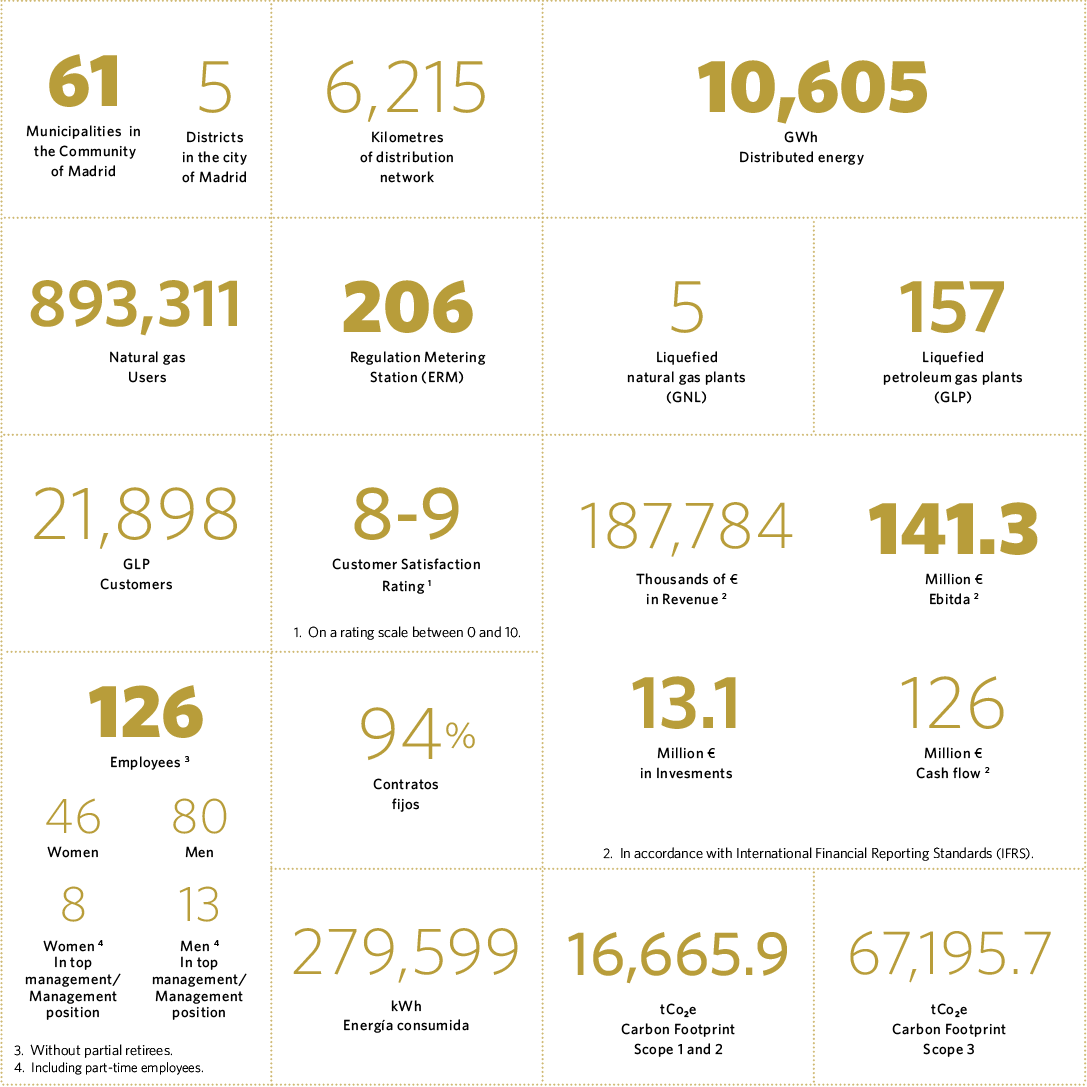
2.3 Our business
Madrileña Red de Gas S.A.U (MRG) is a company operating in the natural gas distribution sector, as well as in the sale of piped liquefied petroleum gases.
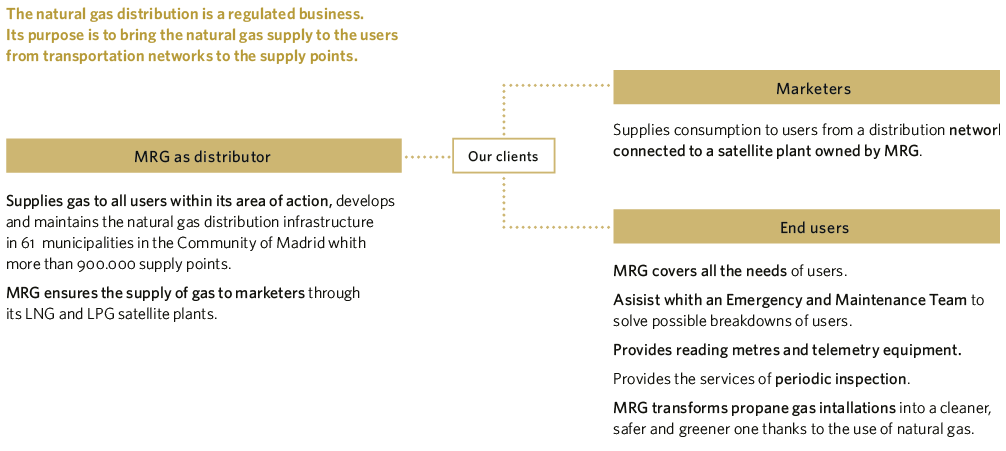
In 2021 the health crisis continued to leave its mark on sales trends and on the gas market in general, and even more markedly on residential markets. We are now in a period of market recovery, which is reflected in the new supply points put into service in 2021, with contracting trends that are similar to previous years.
Despite this situation, the figures once again indicate the success of the company’s expansion strategy in a highly volatile environment, due mainly to rising energy prices and the emergence of new technologies.
At MRG a total of 15,437 new domestic installations entered into service in 2021. When combined with commercial premises, boiler rooms in communal residential buildings, institutional buildings and industries, a total of 15,930 new supply points were provided in our distribution area (not including 726 facilities transformed from using LPG).
Expectations were exceeded in 2021 in terms of new-build homes delivered. Although the construction sector did not come to a complete halt during the crisis, building work has since regained its pace, helped in part by the projects launched prior to approval of the current Technical Building Code.
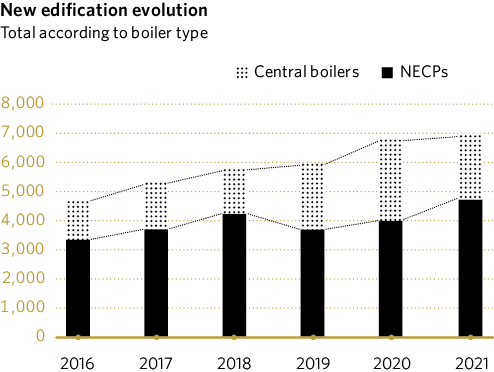
The Madrid region is Spain’s autonomous community with the highest growth in the property market, with new housing developments in towns such as Alcalá de Henares, Colmenar Viejo and Torrejón de Ardoz, and with more than 15 thousand homes expected to be built in the coming years. Over the course of 2021 a natural gas supply was provided to 6,913 homes, exceeding the initial forecast by 20%. Of these, 4,647 are fitted with individual boilers and 2,266 have central boiler rooms.
The figures once again indicate the success of the company’s expansion strategy in a highly volatile environment, due mainly to rising energy prices and the emergence of new technologies
Through strategic collaboration with the IDEALISTA.com property website, the boost to the vertical saturation market (contracts from homes that already have gas on the property) meant that in 2021 we were able to make an impact on more than 1,400 advertisers of properties in the MRG distribution area, which meant new contracts at times of the year when they are less common, such as in the summer months, with the trend continuing through the year.
We also began conversations with the National Association of Refurbishment Companies (ANERR), with the aim of establishing a collaboration with them in all of their projects in our expansion area, along with other companies specialising in tailored solutions that include energy improvements, thus setting a double commitment, both to the climate and to people’s quality of life.
Currently, in the framework of other projects developed in towns such as San Sebastián de los Reyes and Alcorcón, we are collaborating in the implementation of district networks for heating and climate control. These are projects aimed at ensuring integrated development of essential services, with the ability to provide hot running water, heating, cooling and even lighting, and which also offer the chance to bring in renewable gases such as biomethane and even hydrogen.
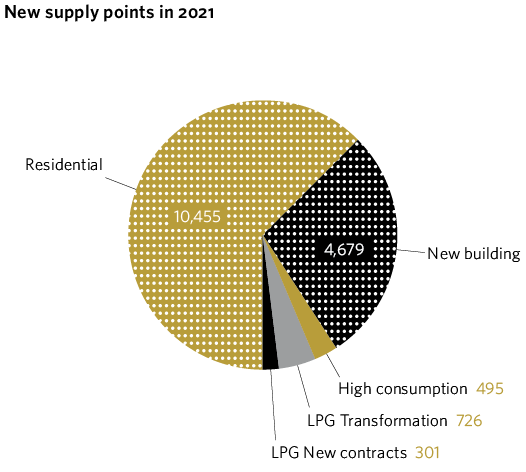
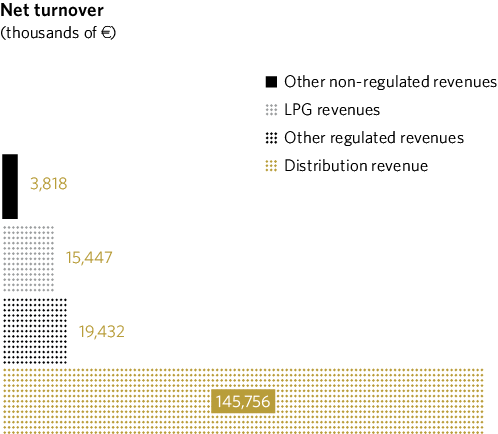
In the high-consumption market we were able to close the year with very positive results, proving that natural gas is undoubtedly essential to this sector. Consumption increased by 189,097 GWh and by 495 new supply points.
Natural gas forms a key part of the energy transition, and its economic and environmental advantages, and guarantee of supply, helped persuade the Hestia medical clinic and El Escorial funeral home to transform to a natural gas supply. Madrileña Red de Gas also collaborated on other important projects, such as designing the interior installation for the new Oasiz shopping mall in Torrejón de Ardoz, which opened in November 2021.
A range of other companies also chose to transform their facilities to a safe and affordable energy supply, including a metal foundry and various food industries. The MRG team has also collaborated closely with Leganés town council, planning works and commissions for the project to bring energy improvements to 13 municipal buildings. A transformation study was also carried out in various military barracks with the aim of lowering energy costs, improving energy efficiency and mitigating the polluting gas emissions.
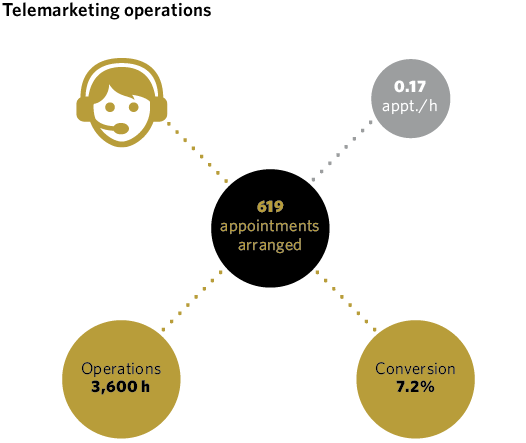
We have reinvented ourselves, working to become a more modern and more accessible company, and strengthening our place in the digitalisation environment
We have reinvented ourselves, working to become a more modern and more accessible company, and strengthening our place in the digitalisation environment. Through use of the tool known as Enerty, which was produced as part of a collaboration between the Association of Installation Companies of Madrid (AGREMIA) and the company Logalty, we were able to process more than two thousand digital certificates through the platform.
We continue working to make our virtual office the point of entry and the place to access all information, from registration requests to information and documentation for customers of installation companies.
In 2021 we focused on reactivating our sales activity, building on the pilot project that began in 2020 in collaboration with Intelcia Spain, with a twofold result, namely being able to reach our potential customers more directly and safely, through a better understanding of their expectations, and securing new supply points.
With regard to sales in digital environments through the company Selectra, our sales call centre, as well as dealing with requests for new supplies, a campaign was implemented to recover lost leads, which proved to be a resounding success.
2.4Gobierno Corporativo
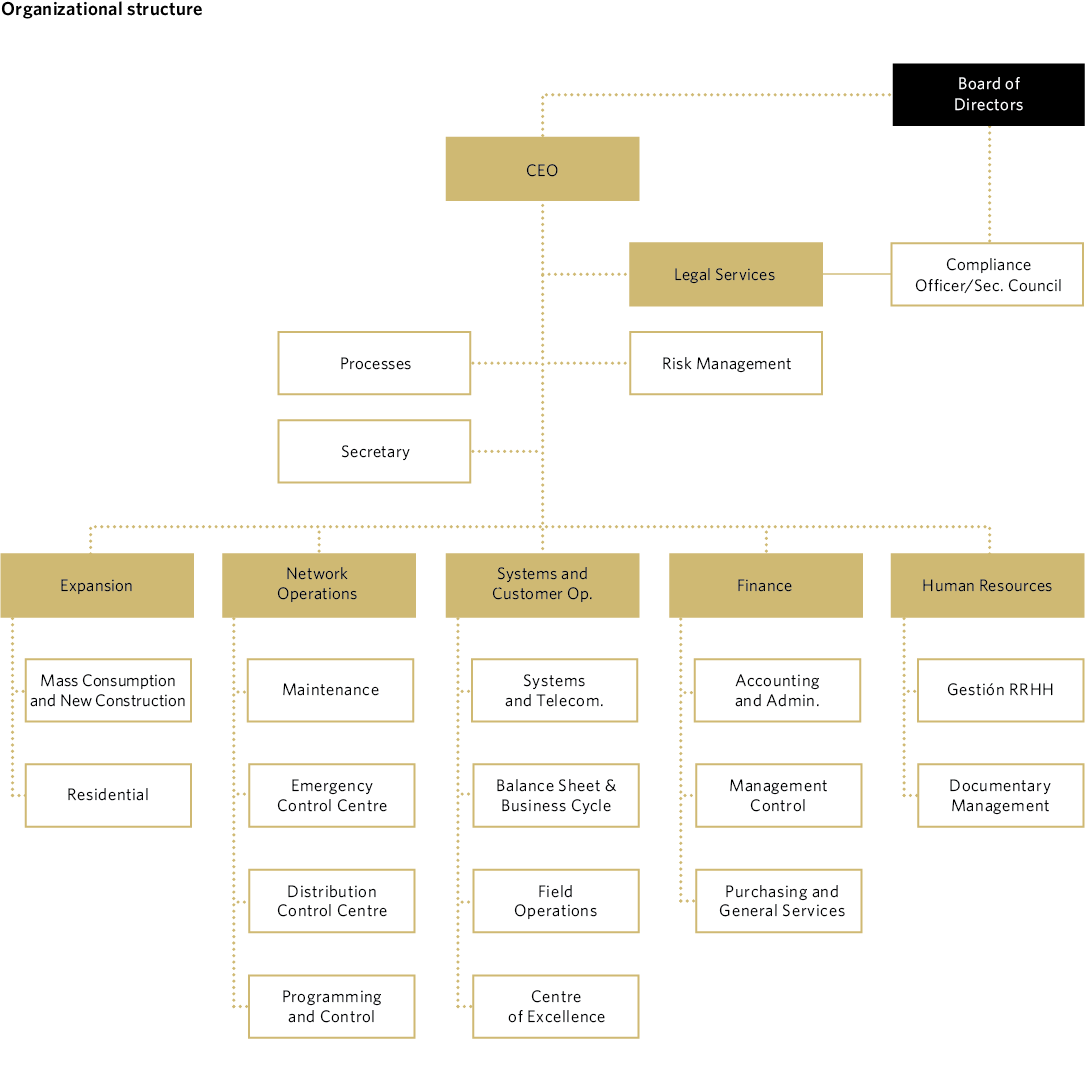
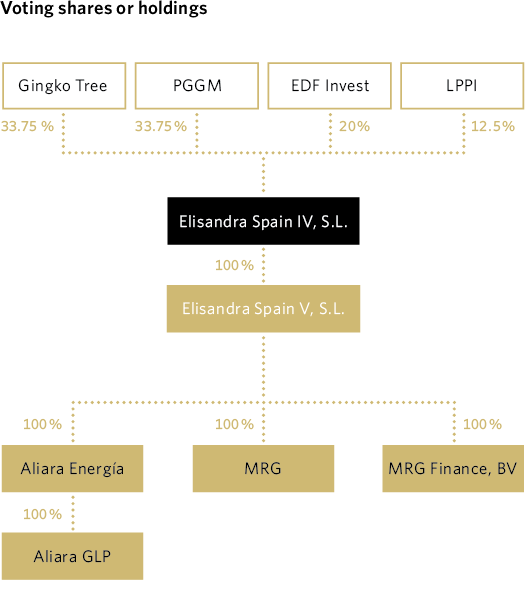
The sole shareholder of Madrileña Red de Gas, S.A.U. is Elisandra Spain V, S.L.U. the parent company of which is Elisandra Spain IV, S.L., and through this, Realgaz, S.A.S. (EDF Invest), Stichting Depositary PGGM Infrastructure Funds (PGGM), JCSS Mike S.A.R.L. (Gingko Tree) and LPPI Infrastructure Investments LP (LPPI).
Elisandra Spain IV, S.L. has four foreign partners with different share percentages or participation with voting rights.
The company’s governance structure is made up of the Board of Directors, the Risks and Audit Committee, the Remuneration Committee and the Executive Committee.
They all include representatives from the four partners of Elisandra Spain IV, S.L.
Governance Structure
- Board of Directors
- Audit and Risk Committee
- Remuneration Committee
- Management Committee
Internal Rules of Governance
- Articles of Association registered in the Mercantile Register
- Regulations and rules of operation of the different committees and commissions
- Code of ethics
- Compliance System
- Internal policies and regulations
Added to this structure is a series of Committees and Commissions, which board members sit on, providing support for responsibilities in governance of a technical nature.
Other Bodies and Committees
- Risk Committee
- Cybersecurity Committee
- Criminal Offences Committee
- Crisis Committee
- Major Accident Prevention Committee
- Code of Ethics Commission
- Data Protection Committee
- Prevention, Environment and Quality Committee
- Others
Board of Directors
(Pedro Mielgo, individual representative)
Dennis van Alphen Director
Andrew Scott Wilkie Director
Martijn Jaap Gijsbertus Verwoest Director
Jaime Francisco Fernández-Cuervo Infiesta Director
Suyu Wu Director
Romain Thierry Victor Bruneau Director
Pierre Alexandre Marie Jean Benoist d’Anthenay Director
Simon George Davy Director
María Martín Secretary (not Director)
The Board of Directors is the governing body established in the company’s duly registered articles of association and acts as a single body. Its members are all non-executive proprietary directors, in contrast with the Executive Committee, which does have members with executive powers.
The board acts as a body, so no significant positions are held beyond the existence of a Board Chair. It is governed by the articles of association and by the commitments, rights and obligations established in the Capital Companies Act.
Board members are proposed by the Board of Directors itself, and their appointment is accepted by the sole shareholder, in accordance with the legal provisions in this regard. There are no independent members, and positions are held for six years.
The Board of Directors does not have its executive powers delegated to any one of its members. The agreements it reaches are executed by the company’s Managing Director, who together with the Financial Director and the Finance Department is the only person with general powers in terms of management, administration and decision making.
Should any conflict of interests be detected, the members must inform the Board of Directors and the company itself. Any such report is documented and included in the company’s report. Additionally, as established by the Capital Companies Act, for any cases in which a possible future conflict of interests is expected to arise, article 230 of said legal text sets out the procedure to deal with individual cases, which depending on the particular case will be by the Board itself or, in this case, by the sole shareholder.
As the highest governing body, the Board of Directors defines the company’s senior strategy, validates management guidelines and monitors the results.
It approves the mission, vision and values statements defined by the company’s Executive Committee. It also approves the policies, strategies and objectives relating to economic, environmental and social issues as defined by the Executive Committee.
The Board of Directors convenes meetings on a quarterly basis as well as extraordinary meetings when deemed appropriate.
The quarterly meetings are planned at the end of each year with the aim not only of organising the content and agenda of each meeting, but also so that all necessary information that is to be discussed is made available.
During these meetings, the results from the period provided by the Executive Committee are analysed in order to monitor and define strategies, how activities are progressing, any economic, environmental and social issues that are relevant to the company and, at the request of the board’s members, detailed information is provided on any topics considered pertinent.
The performance of the company’s governing body is assessed through the annual accounts audit conducted at the end of the financial year, which in compliance with Law 11/2018 on Non-Financial Information and Diversity provides verifiable non-financial information from an independent third party.
As part of this performance assessment process, for the sixth year in a row Madrileña Red de Gas has been part of the GRESB initiative, submitting information on its ESG (environmental, social and governance) performance as described in section 2.5 of this report.
The Board of Directors is an unpaid body, as mandated in the company’s articles of association.
For the sixth year in a row Madrileña Red de Gas has been part of the GRESB initiative, submitting information on its ESG (environmental, social and governance)
There are two committees on the board, the Audit and Risks Committee and the Remuneration Committee, each with specific tasks, about which they report to the board.
Audit and Risk Committee (ARC)
Simon Davy
Andrew Scott Wilkie
Pierre Benoist d’Anthenay
Alejandro Lafarga
Inés Zarauz
Alfonso Garcia, Risk Manager, Secretary
According to MRG’s internal rules of procedure, the Audit and Risks Committee reports directly to the Board of Directors and operates in accordance with said rules, which define its objectives, functions and composition. This committee is made up of representatives from the four shareholders who sit on the Board of Directors, various members of the Executive Committee and the Risk Management Department.
The contents of its agenda are discussed in periodic committee meetings, which are held prior to each Board of Directors meeting, and are agreed on internally at the beginning of each new financial year. Recurring topics include monitoring the map of corporate risks, the most relevant risks and the established or proposed checks and mitigation plans, accounts audits, audits of the integrated prevention, environment and quality system, matters relating to sustainability, policy on the prevention of criminal offences and cyber security risks
These activities mean that MRG is able to issue recommendations intended for risk management and/or for the Board of Directors. Additionally, as a result of COVID-19, monitoring of how the specific risks map is evolving remains in place. This map sets out risks of a financial nature, such as the potential impacts on operating margins, liquidity and credit risk, as well as risks relating to difficulties in carrying out interventions in the homes of users affected by the pandemic, the availability of resources for the continuity of operations and/or failures in the supply chain, and ensuring the business continuity plan and job safety analysis are appropriately monitored.
The Audit and Risks Committee reports directly to the Board of Directors and operates in accordance with said rules, which define its objectives, functions and composition
Remuneration Committee
- The Committee is composed of the Chairman of the Board of Directors and up to four other members of the Board.
- The General Manager of MRG and the HR Director (Secretary) participate in the meetings, except when their own remuneration is discussed.
Stakeholder involvement in the remuneration of senior executives occurs through the Remuneration Committee.
The Remuneration Committee will decide on and recommend to the Board of Directors the framework and general policy for remuneration and any variation of the conditions of service of the CEO, the Financial Director and any other member of senior management that it is deemed appropriate to consider, or of any other members of staff. It is responsible for all elements of remuneration of the directors of MRG’s various units, which consist of base salary, allowances, benefits and expenses.
It undertakes to agree at the general level the principles and structure of the proposed remuneration of all members of Madrileña Red de Gas not covered by the Collective Bargaining Agreement (CBA), to consider how to attract retain and develop talent together with the CEO, and to establish both succession and review plans.
The Committee meets at least once or twice a year, thought they can also meet more frequently when necessary. Proposals made by the Committee are sent to the Board of Directors.
Management Committee
Rafael Fuentes Legal Director
Inés Zarauz Financial Director
David Ortiz Carreras Expansion Director
Glen Lancastle Customer Systems and Operations Director
María Vázquez Human Resources Director
Félix Blasco Network Operations Director
The Executive Committee is a body on which the company’s General Manager or CEO sits, along with the six unit directors. The unit directors report to the committee on operative and management proposals that they consider appropriate or necessary for their units. The executive decisions reached by the Executive Committee are adopted by the company’s managing director or CEO.
Its main functions are as follows:
- Define and monitor polices, strategies and objectives, which are submitted to the General Manager, so that the company’s strategy plan can be implemented.
- Monitor overall performance and the performance of specific projects in the company’s operative and business areas: expansion, customer operations and network operations.
- General supervision of economic performance goals being met.
- Identify risks and opportunities. Define and monitor policies and plans to mitigate risk.
- Performance targets set by the Managing Director through various processes and supervision of the company’s management indicator scorecard. Propose and implement improvement actions.
- Monitor the various cross-cutting corporate issues considered relevant (legal regulation and compliance, sustainability, human resources, health and safety, personal data protection, preventing criminal offences, etc.).
The objectives and working practices of the technical committees identified in this chapter are set out throughout this report, depending on their particular area or scope.
2.5 Global Real Estate Sustainability Benchmark (GRESB)
Madrileña Red de Gas is Europe’s second-highest gas distribution company on the GRESB global infrastructure sustainability benchmark, out of more than 500 participants.
GRESB is a worldwide sustainability index that assesses and rates the work carried out by more than 500 funds and assets in different sectors in order to promote sustainable development, based on a global environmental, social and governance standard. Since 2009, the organisation has sought to assess and compare the non-financial performance of businesses and financial institutions by publishing an annual benchmark. This ranking provides data that is standardised and has been validated by the financial markets, and is a world leader in measuring the sustainability performance of companies across the globe.
The benchmark, adapted to international reports such as the Global Reporting Initiative (GRI), enables us to identify areas of risk and opportunity, compare our performance with that of other companies in the sector and inform our stakeholders about our ESG performance by means of an internationally recognised global standard.
In the 2021 edition, Madrileña Red de Gas achieved the maximum rating of five stars, with a score of 93 out of 100. This is a 93.75% improvement compared with 2020. This means we became the second-best rated European gas distributor, exceeding the average score of 72 out of the more than 500 companies that took part.
Madrileña Red de Gas is Europe’s second-highest gas distribution company on the GRESB global infrastructure sustainability benchmark, out of more than 500 participants
GRESB gave MRG two special mentions for “Infrastructure asset most improved”, in recognition of the company’s progress in its sector and its region.
These improved results in this benchmark rating provide a view of how the company is evolving with regard to previous years and its degree of maturity in terms of best practice in its environmental, social and governance (ESG) policies.
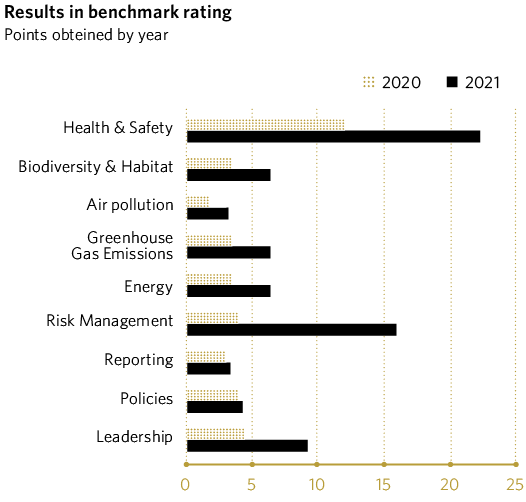
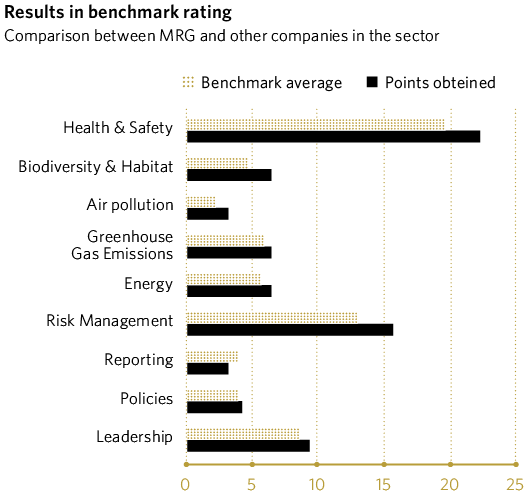
As well as how the company is evolving, it is also important to compare this with how other businesses in the sector are performing. Madrileña Red de Gas obtained a score above the sector average due to its approach to aspects such as leadership, policies, risk management, biodiversity and habitat, health and safety, greenhouse gas emissions and air pollution.
The high score justifies the five-star rating, the result of excellent performance and great involvement from all levels of the company, showing our firm commitment to implement best practice on matters of social, environmental and corporate governance responsibility.
This commitment aligns the company with the United Nations Global Compact. At MRG we continue to ensure that the 2015-2030 Sustainable Development Goals form a comprehensive part of our strategy.
In-depth analysis of the GRESB result allowed us to identify improvements to be made to our sustainability management model, based on the ISO 26001 standard, and these will be developed throughout 2022.
